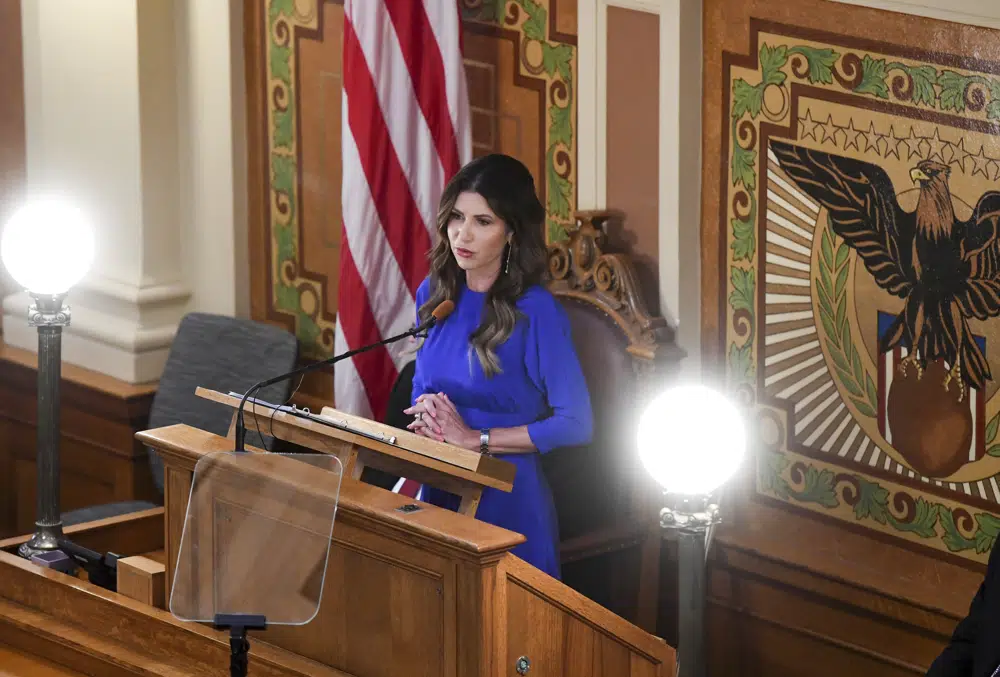
Gov. Kristi Noem called Tuesday for using the state’s surplus to eliminate the tax charged on groceries and lower other taxes in a State of the State address that steered clear of the hot-button topic of abortion.
The Republican governor, who is seen as a potential contender for the 2024 White House, delivered her address as the Legislature’s nine-week session began. All eyes are on what lawmakers might do with the state’s $423 million surplus.
Noem said that shoppers are “astonished” when they arrive at the checkout line to pay for their groceries. She said it is so costly that she has watched many shoppers have to put items back on the shelves because they don’t have enough money to purchase them.
“South Dakotans need this relief,” said Noem, whose executive budget calls for repealing the state’s 4.5% sales tax on groceries, a move that would save taxpayers $100 million.
Noem was critical of a proposal to repeal the state grocery tax during the final days of the legislative session in March, but this fall, she changed course and made it a centerpiece of her reelection campaign. She has called repealing the tax her top priority for 2023, arguing that the state’s surplus would cover the revenue loss.
While minority Democrats support the idea, a number of staunch Republicans oppose it, questioning whether the state can absorb the lost revenue.
“We will help every single family in the state,” she said. “And then they have the freedom to decide how to use those dollars to meet their needs in their family.”
Sen. Casey Crabtree, the Republican caucus leader, said he also anticipates sales and property tax reduction proposals. He was vague about the legislation’s prospects of success.
“We’ll see where it all ends up,” he said.
House GOP leader Rep. Will Mortenson said several tax reduction proposals, including the proposed grocery tax cut, will be the subject of debate.
“Of course, as a conservative, I would prefer that no one pay any tax,” he said. “But given that we have limited budget resources, we’ll need to be weighing all these proposals against each other.”
Budget-setting during most of Noem’s first term was filled with state revenues swollen by consumer spending and federal pandemic relief. Lawmakers are also cautioning that those years of plenty — when millions of dollars went to upgrading university campuses and other projects — could soon be over.
Noem also highlighted workforce shortages, noting that the state has 23,000 open jobs. To address that, she called for updating licensing requirements for professional jobs. She said that other states like Arizona that have taken steps to recognize out-of-state licenses have added thousands of workers.
“That’s the kind of drastic workforce boost that we need right here in South Dakota,” she said.
Noem is also calling for improving paid family leave and creating a way for childcare workers to get benefits.
Under her family leave proposal, state employees could get their entire salary paid for 12 weeks, instead of the 60% that is currently offered for eight weeks. The new policy would cover new births or adoptions, as well as taking care of a child, spouse, or parent with a serious health condition, or a situation where a spouse is called to active-duty military service.
Her plan also calls for allowing private sector companies to be a part of the state’s risk pool, which would make it cheaper for them to offer the benefit, and providing $20 million in grants to incentivize them to participate.
Those proposals are key pieces of her goal of supporting families alongside a bid to uphold the state’s abortion ban, which was triggered by the U.S. Supreme Court’s June ruling. Noem, an ardent abortion opponent, faces a challenge to the ban through a citizen-proposed constitutional amendment that could appear on the 2024 ballot. She never discussed the issue directly in her address, though.
Democratic Sen. Reynold Nesiba was critical of Noem for bypassing the issue.
“At the moment that a woman needs access to reproductive health care, it is far easier for them to simply go somewhere else if they have the means to do that,” Nesiba said. “But one shouldn’t have to leave the state to be able to have access to reproductive health care.”
Noem also notably stepped up her rhetoric against China, touting legislation that would create a board that would review the sale or lease of agricultural land to non-Americans. The move came after she blocked the Chinese-owned social media app TikTok from state devices in November 2022 and ordered a review of Chinese investments.
“We can’t allow Chinese interests to purchase any South Dakota ag land, much less any land near any military base or critical state infrastructure,” she said.
